Proper care after dental implant surgery is crucial for a smooth recovery. Following post-op instructions helps minimize complications and ensures the implant’s success and longevity.
Overview of recovery process and importance of following instructions
The recovery process after dental implant surgery is straightforward when proper care is taken. Following post-operative instructions minimizes complications, promotes healing, and ensures the implant integrates successfully. Rest, nutrition, and avoiding harmful activities are crucial. Adhering to guidelines helps prevent issues like infection or implant failure, ensuring a smooth recovery and a successful long-term outcome for your new smile.
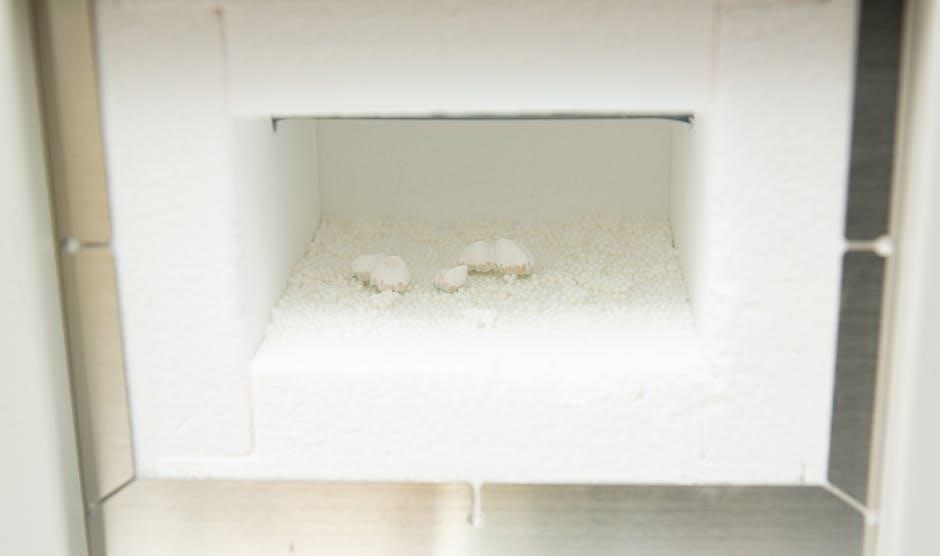
Immediate Post-Surgery Care (First 24 Hours)
After surgery, bite on gauze for 30-60 minutes to control bleeding. Apply ice to reduce swelling and avoid strenuous activities. Stick to a soft diet and avoid disturbing the surgical site to promote healing.
Managing bleeding and swelling
Minor bleeding is normal after implant surgery. Bite firmly on gauze for 30-60 minutes to promote clotting. Apply an ice pack to the affected area to reduce swelling. Avoid strenuous activities that could dislodge the clot. Swelling typically subsides within a few days. If bleeding persists or swelling worsens, contact your dentist immediately for further guidance.
Initial oral hygiene practices
On the night of surgery, rinse gently with prescribed Peridex Oral Rinse before bed. The next day, rinse twice daily, after breakfast and before bed, for 30 seconds each time. Avoid vigorous spitting or rinsing. Keep the mouth clean to promote healing and prevent infection. Gently brush teeth, avoiding the implant site. Maintain good hygiene to ensure the implant integrates smoothly and reduces recovery time.
Pain Management and Medications
Prescribed medications, such as pain relievers, should be taken as directed to manage discomfort. Local anesthetics may last 3-6 hours, with pain meds starting after eating soft food.
Prescribed medications and their usage
Your dentist may prescribe pain relievers or antibiotics to manage discomfort and prevent infection. Start medications as directed, often after eating soft food to avoid nausea. Follow dosage instructions carefully and complete the full antibiotic course if prescribed. Notify your dentist if side effects occur. Pain medications should be taken as needed, but always with food to reduce stomach discomfort. Adhere strictly to the prescribed regimen for optimal recovery.
Managing discomfort and pain expectations
Discomfort after dental implant surgery is normal and typically mild to moderate. Pain usually peaks in the first few days and subsides as healing progresses; Local anesthetic effects last 3-6 hours, after which prescribed pain relievers can be taken. Ice packs may help reduce swelling and discomfort. Rest and avoiding strenuous activities are recommended during the initial recovery phase. Most patients find the pain manageable with proper medication and care.
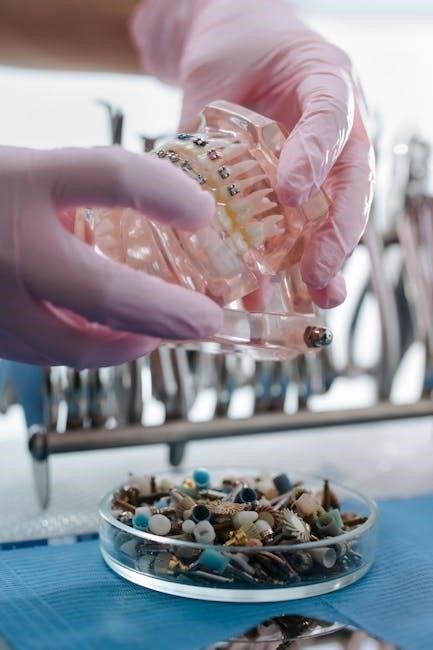
Dietary Recommendations
A soft food diet is essential for the first week post-surgery. Stick to foods like yogurt, smoothies, and mashed potatoes, avoiding hard or crunchy items. Opt for nutrient-rich meals to support healing while minimizing discomfort and risk of complications.
Soft food diet and nutrition guidelines
Soft Food Diet and Nutrition Guidelines
A soft food diet is crucial during the initial healing phase. Opt for foods like yogurt, scrambled eggs, and mashed potatoes to avoid irritating the implant site. Ensure meals are nutrient-rich to support recovery. Protein, vitamins, and minerals are essential for tissue repair. Avoid chewing directly over the implant site and choose foods that require minimal chewing. Stay hydrated by drinking plenty of water to aid healing and prevent dehydration. A balanced diet promotes faster recovery and reduces complications. Incorporate soft fruits and vegetables, such as bananas and avocados, for added nutrition. Avoid spicy or acidic foods that might cause discomfort. By adhering to these guidelines, you can protect your implant and ensure a smooth recovery process. Proper nutrition is key to healing and maintaining the longevity of your dental implant. A soft food diet helps minimize discomfort and reduces the risk of complications during the recovery period. Focus on easily digestible foods that provide essential nutrients for optimal healing. This approach will help you recover quickly and enjoy the benefits of your new implant. Remember, a well-planned diet is vital for a successful recovery after dental implant surgery.
Foods to avoid during recovery
Foods to Avoid During Recovery
During recovery, avoid hard, crunchy, or chewy foods like nuts, chips, and tough meats, as they can dislodge the implant. Steer clear of spicy, acidic, or sharp foods that may irritate the surgical site. Hot beverages and foods should be avoided initially, as they can cause discomfort. Also, refrain from alcohol and smoking, as they hinder healing and increase the risk of complications. Stick to a soft food diet to protect the implant and ensure proper healing.
Oral Hygiene Practices
Good oral hygiene is essential for healing and implant longevity. Use prescribed Peridex Oral Rinse as directed, starting the night of surgery. Gently brush the area with a soft toothbrush, avoiding direct contact with the implant site. Avoid vigorous rinsing or spitting to prevent dislodging the blood clot, which is crucial for proper healing.
Specific cleaning instructions for the implant site
Specific Cleaning Instructions for the Implant Site
Gently clean the implant site to promote healing. Use a soft-bristled toothbrush to clean around the implant, avoiding direct pressure. Start with the prescribed Peridex Oral Rinse the night of surgery, then twice daily afterward. Do not use harsh mouthwashes or scrub the area vigorously. Instead, rinse gently, letting the solution fall out without spitting. This helps protect the healing site and prevents complications.
Recommended oral rinse products and usage
Recommended Oral Rinse Products and Usage
Use the prescribed Peridex Oral Rinse, starting the night of surgery and continuing twice daily. Rinse gently for 30 seconds, then spit it out. Avoid vigorous spitting or rinsing. This helps maintain hygiene without dislodging the blood clot. For the first week, use a mild, non-alcoholic mouthwash if recommended. Avoid harsh products that could irritate the healing site. Proper rinsing promotes healing and reduces the risk of infection or complications.
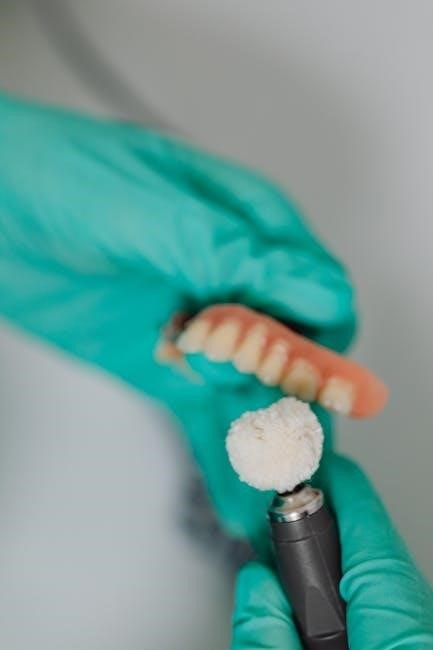
Rest and Activity Level
Rest is essential for healing. Avoid strenuous activities for a few days post-surgery. Keep your head elevated and stay hydrated to promote recovery and reduce swelling.
Importance of rest and avoiding strenuous activities
Resting after dental implant surgery is crucial for proper healing. Avoiding strenuous activities helps prevent dislodging the blood clot, which is essential for healing. Elevate your head to reduce swelling and avoid bending or lifting. Staying hydrated supports recovery, and listening to your body ensures you don’t overexert yourself. This allows your body to focus on healing, reducing the risk of complications and promoting a smooth recovery process.
Resuming normal activities
Most patients can resume light activities within a few days after surgery. Avoid vigorous exercise for about two weeks to prevent complications. Stick to soft foods initially, gradually introducing solid foods as healing progresses. Listen to your body and avoid actions that cause discomfort. Contact your dentist if you experience unusual symptoms. Proper pacing ensures a smooth transition back to normal life while safeguarding the implant’s success.

Avoiding Harmful Activities
Avoid smoking for 10 days and alcohol for 48 hours post-surgery. Refrain from strenuous activities and disturbing the implant site to prevent complications and promote healing effectively.
Smoking and alcohol consumption
Smoking and alcohol consumption must be avoided post-surgery. Smoking can impede healing, reduce blood flow, and increase the risk of complications, including implant failure. Alcohol should not be consumed for at least 48 hours, as it can disrupt blood clot formation and prolong recovery. Both habits can significantly hinder the healing process and compromise the success of your dental implant. Avoiding them is essential for optimal results and a smooth recovery.
Other activities to avoid
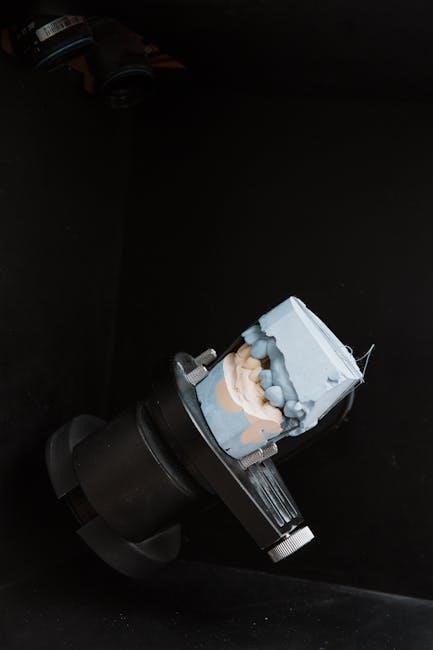
Avoid activities that could disrupt the healing process. Do not disturb the surgical site with your tongue or fingers, as this can dislodge the blood clot, delaying healing. Refrain from strenuous activities for the first few days, as they may increase swelling or discomfort. Additionally, avoid using a straw, as the suction can dislodge the clot. Lastly, steer clear of hard or crunchy foods until your dentist advises it is safe. These precautions are vital for proper healing.
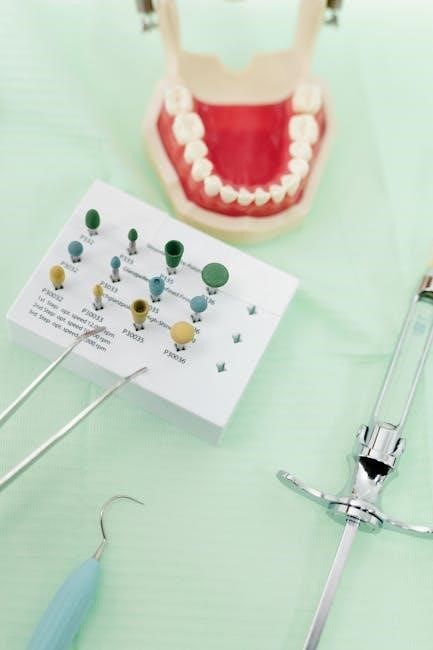
Monitoring Healing Progress
Monitor your healing by observing bleeding, swelling, and discomfort levels. Follow post-op instructions to ensure proper recovery and watch for signs of complications, if any arise.
Signs of proper healing
Proper healing is evident when bleeding subsides, swelling decreases, and the implant site feels stable. Gums return to a normal color, and mild discomfort fades within days. Full recovery typically occurs within a week, with the implant integrating smoothly into the jawbone. Adhering to post-op instructions ensures optimal healing and minimizes complications, promoting a successful outcome for your dental implant.
Watching for complications
Monitor for excessive bleeding, severe swelling, or persistent pain beyond expected levels. Signs of infection, such as redness, pus, or fever, indicate a potential issue. If the implant feels loose or discomfort worsens, contact your dentist immediately. Avoid smoking or dislodging the blood clot, as these can impede healing. Early detection of complications ensures timely intervention, safeguarding the success of your dental implant procedure.
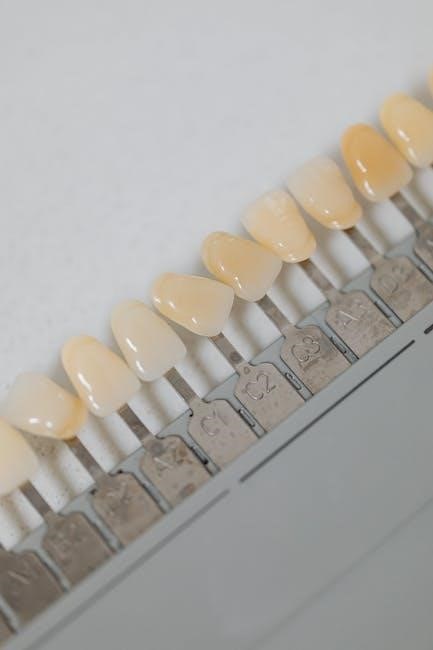
Follow-Up Appointments
Scheduled check-ups are essential to monitor healing progress and ensure the implant is integrating properly. Attend all appointments as directed by your dentist to guarantee optimal results.
Importance of scheduled check-ups
Importance of scheduled check-ups
Regular follow-ups are crucial for monitoring the healing process and ensuring the implant integrates successfully. These appointments allow your dentist to assess the site, remove sutures if necessary, and address any concerns early. Consistent check-ups help prevent complications and ensure proper healing, ultimately contributing to the long-term success of your dental implant.
What to expect during follow-ups
During follow-ups, your dentist will examine the implant site to ensure proper healing and integration. They may remove sutures, assess gum health, and verify the implant’s stability. Expect personalized advice on continuing care and any necessary adjustments. These visits are crucial for addressing concerns early and ensuring the implant’s long-term success. Your dentist will also schedule future appointments as needed to monitor progress.

Possible Complications and Solutions
Infection, implant failure, or nerve damage can occur. Solutions include antibiotics, additional surgery, or implant adjustment. Addressing issues promptly ensures optimal recovery and implant success.

Common complications and their management
Common issues after dental implant surgery include infection, implant failure, or nerve sensitivity. Infection can be managed with antibiotics, while failed implants may require replacement. Nerve sensitivity often subsides but may need medical evaluation. Monitoring symptoms and contacting your dentist promptly is essential for effective resolution and preventing further complications. Early intervention ensures better outcomes and implant longevity.
When to contact your dentist
Contact your dentist if you experience heavy bleeding, severe pain, swelling, or fever. Notify them if you notice implant mobility, numbness, or signs of infection. If medications aren’t effective or symptoms worsen, seek immediate attention. Timely communication ensures complications are addressed early, promoting optimal healing and implant success. Don’t hesitate to reach out with concerns or unusual symptoms.
Adherence to post-op instructions ensures a smooth recovery and optimal implant success. Prioritize rest, a soft diet, and proper hygiene for the best outcomes.
Final tips for a smooth recovery
- Stick to a soft, nutritious diet to support healing and avoid discomfort.
- Avoid smoking and alcohol for at least 10 days to prevent complications.
- Keep the implant site clean with recommended oral rinses and gentle brushing.
- Attend all follow-up appointments to monitor healing progress.
- Listen to your body and rest adequately to promote recovery.
- Do not disturb the surgical site or sutures to ensure proper healing.

